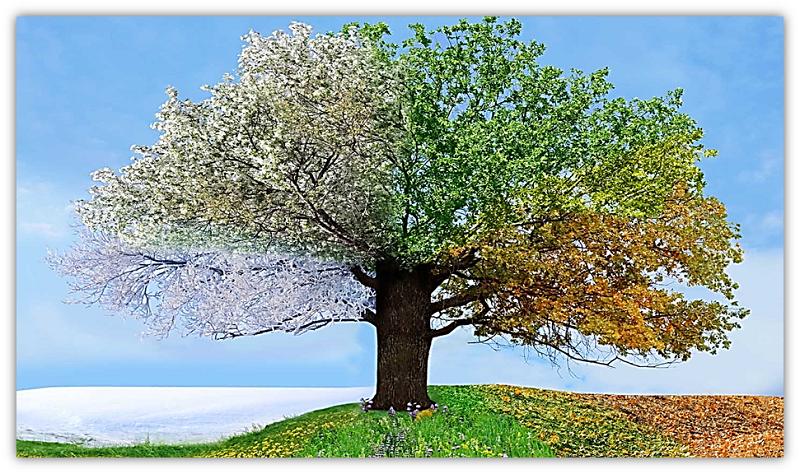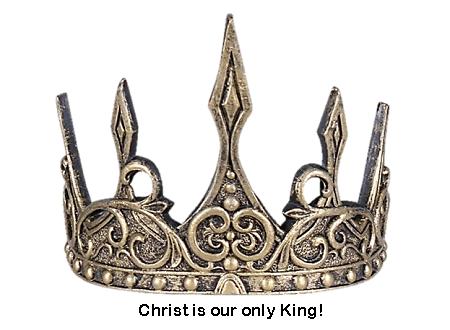Ecclesiastes 1:17 – Beyond Madness and Folly
Ecclesiastes 1:17 – Beyond Madness and Folly
And I applied my mind to know wisdom and to know madness and folly. I perceived that it is also but a striving after wind.
Ecclesiastes 1:17
And let our people learn to apply themselves to good deeds …
Titus 3:14

Give Thanks?⤒🔗
We have shared the fruits and harvest of another season, and have again experienced the goodness and the kindness of God in supplying all our needs with an abundance of earthly gifts. Again one can say: God's promise holds true, for seedtime and harvest continue as long as the world remains, Genesis 8:22.
And yet Qoheleth, the teacher of wisdom among God's people who was God's instrument in writing the book Ecclesiastes, does not appear to us as such a thankful figure. He observes the regular recurrence of the seasons and the flow of the generations, and only concludes: All things are full of weariness!
What has been is what will be, and what has been done is what will be done; and there is nothing new under the sun.Ecclesiastes 1:9
What is there to give thanks about? All this has happened since the beginning of the world, and we can only expect things to continue in this way. What do we gain by all our toil? It is all vanity and a striving after wind. Wisdom, madness and folly – they are all the same. What difference does it make if you pursue one or the other?
Vanity of Vanities …←⤒🔗
Like all books of the Bible, Ecclesiastes must be understood in the context of its time. The writer takes the name of Solomon and so is clothed by God with the authority of Solomon. Yet he does so in such a way that it is clear that he had a certain edge on Solomon: he lived much later than Solomon did. He had that much more history and knowledge to work with, living as he did in Israel's time of decline, under Greek or Persian rule. In fact, through him God presents to us as in a mirror what the ultimate end of the wisdom and, glory of Solomon was. No one surpassed this king in greatness of wisdom and understanding. But what was its end? It all came to nothing. Vanity of vanities … it was all a striving after wind.
Wisdom, Madness and Folly←⤒🔗
The world has changed since Solomon's day, yet, there are many similarities between his time and ours. His was a time of unparalleled prosperity, a time of expanding possibilities in Israel. "Judah and Israel were as many as the sand of the sea, they ate and drank and were happy," 1 Kings 4:20. Solomon had made friends with neighbours and brought foreigners into subjection, and during his reign the land enjoyed peace and tranquility. The years of strife and bloodshed appeared to be gone forever.

And Solomon himself? He had "largeness of mind" (1 Kings 4:29) and his years were spent in learning and discovery. He became Jerusalem's greatest builder. And according to the style of the day, from wisdom he ventured to madness and folly, the pursuit of human pleasure and sensual delights. "Madness" here is the excessive frivolity and dissipation of the idle rich. Here we think of foods, music, the arts and even carnal pleasures. In this respect, Solomon was also a child of his time. He loved many foreign women, and his wives turned away his heart after other gods, 1 Kings 11:1, 4.
Now the LORD uses Qoheleth to show us what the result of all the investigation and striving of man is. Solomon functions as a type for all those after him. And the rule is the same: the pursuit of all these ends does not bring any essential change in man's condition. Indeed, wisdom is better than folly, as light excels darkness, cf. 2:13. Yet no one really accepts wisdom, and in the long run people will indulge in dissipation, reveling and folly. Riches is better than poverty, but also brings no lasting reward. In the long run, all go to the grave, and everyone loses the wealth he gained under the sun.
The Way of the King←⤒🔗
So we touch on the divine truth that rings forth so clearly in this book, the truth that makes this book so important in the canon: our human nature always has a propensity to evil, and no amount of human searching or striving can change our condition. The writer sums it up from Solomon to the close of the kingdom, from beginning to end, and he concludes: there was not one king who brought us anything more than what Solomon brought. And all of Solomon's pursuits testify to the same result: a striving after wind. For what was left of it in Qoheleth's day?
The tenor of the book is thus qualified by its place in the canon. Indeed, the fear of God remains an essential theme in the book. And the knowledge of God is presupposed. He is mentioned no less than thirty-seven times! Yet He deliberately appears distant, and almost removed from the world. His justice and longsuffering with men – these virtues are accented. In fact, the book explicitly alludes to the delay in divine judgment, 8:11. God never reaches in to punish men before it is absolutely necessary, or before their guilt is manifest to all.
Precisely this delay allows one to get a clear picture of the result of all things under the Old Testament theocratic ruler. There was much good in Solomon's works – unsurpassed wisdom, upright service, the building and dedication of the temple, and so on. But the passing years also saw a multiplication of evil in the style of the kings of the age: the acquisition of horses and chariots, many wives, and other marks of opulence and decadence. Solomon went from wisdom to folly, and from sobriety to madness. His kingship was unsurpassed throughout the Old Testament. Yet it was at bottom a mixture of a kingship moulded by divine revelation and humanistic motivations.
In this light, all ends in vanity. Indeed, because divine delay so keenly stamps the book, the sense of the fear of God, while distinct and present, is almost outweighed by the sense of the futility of all things. So the book seeks to awaken a deeper sense of allegiance to the longsuffering God and perseverance in faith as well as a patient and enduring waiting upon Him, – because all else fails. God appears here as the One who is outstanding, and the One who in righteous longsuffering delays His vindication beyond all human capabilities of patience and endurance.
Solomon's Greatness←⤒🔗
Qoheleth surely does not want us to think lightly of Solomon. Indeed, there was no greater king of all the kings of the earth! But Solomon followed the way of the king: that is the way of human nature. In the days of Qoheleth, the prophetic line had died out; the kings had disappeared, and the priestly line was at a low ebb. So we are directed to see how incomplete the forms and gifts of the old covenant are when taken in themselves. Indeed, this book cries out for the new dispensation! For everything is present in the book: God's goodness, His faithfulness, His justice and His longsuffering. Only one thing is markedly outstanding: His coming! His visitation! His salvation! Qoheleth yearns for the dawn of a new age! Only God's hand can break the vicious cycle of weariness on earth!

One Greater than Solomon is Here!←⤒🔗
This is what has been given to us. Solomon surpassed all the kings of the earth, and all the kings after him; and Qoheleth, as a disciple of his school of wisdom, had a slight edge on him. The mirror he holds up presents us with the true Solomon. So Qoheleth looks for the King who will radically and essentially surpass Solomon and every earthly king: the Messiah! This was the only kind of light that could put the dark shadows of vanity to flight. And the light appeared in Jesus Christ! With His coming all delay has ended! His coming brings renewed hope and expectation! Indeed, it brings more: through the Spirit the reality of the kingdom may be solidly embedded in the hearts of men. The kingdom of God, which had already shown brightly in the days of Solomon, but later had dimmed due to the frailty of human nature, now takes on new and enduring light, finding an enduring place among men through the dwelling of the Spirit in our hearts. One greater than Solomon is here!
Give Thanks!←⤒🔗
If even in Solomon's day there was still reason enough to be thankful, how much more today! For Christ appeared and gave Himself for us, "to redeem us from iniquity and to purify for Himself a people of His own who are zealous for good deeds," Titus 2:14. The gift of the Spirit gives a new shape to the desires of our hearts and the pursuits of our minds. No longer do we apply ourselves to idle pursuits. Rather, knowing the day and the hour, let us, as Paul says, learn to apply ourselves to good deeds! The last hour has come! And this gives a new urgency to our life: be thankful! And let your deeds be filled with thanksgiving every day!
For the cycle of the seasons has now become an instrument in the hands of Jesus our Saviour and King, and He wields and uses it for the good of His Church. He has brought meaning to all the loose ends of the old covenant, filling our vanity with life! And we are called to live for Him in the world.
Our deeds are no longer our own, and cannot be done in ourselves. Indeed, in the measure they are done in our own strength, they are subject to the law of vanity, futility and decay. But in the measure that our deeds are done in Christ through faith, we bear lasting fruit. Of His own Christ says, it will be seen that their works are wrought in God.
Let us then be zealous to live in thankfulness, apply ourselves to good deeds, and so inherit with all the saints the crown of righteousness in Christ – our only King!

Add new comment